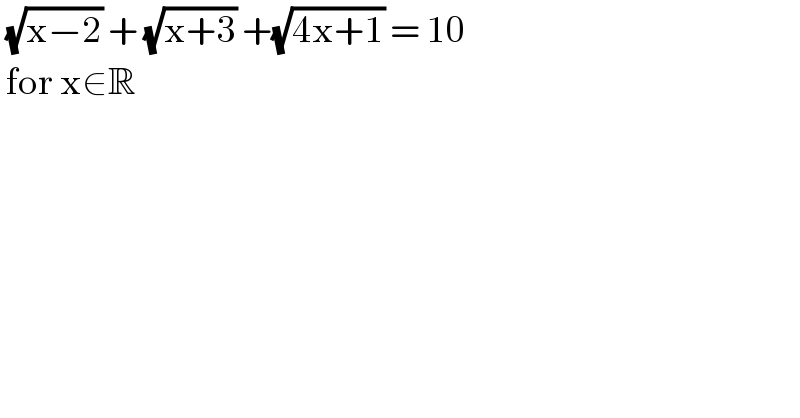
Question and Answers Forum
Question Number 128166 by bramlexs22 last updated on 05/Jan/21

Answered by liberty last updated on 05/Jan/21
![(√(4x+1)) = [ −(√(x+3))−(√(x−2))+10 ] 4x+1 = 2(√(x−2 )) (√(x+3)) −20(√(x+3)) +2x −20(√(x−2)) +101 (√(x+3)) = ((x+10(√(x−2))−50)/( (√(x−2))−10)) x+3 = (x^2 /(x−20(√(x−2))+98)) + ((20x(√(x−2)))/(x−20(√(x−2)) +98)) −((1000(√(x−2)))/(x−20(√(x−2))+98)) +((2300)/(x−20(√(x−2))+98)) (√(x−2)) =((101x−2006)/(40x−940)) x−2 = (((101x−2006)^2 )/((40x−940)^2 )) x = −((399(√(401))−79001)/(3200)) ; x=((399(√(401)) +79001)/(3200)) ; x=6](Q128168.png)
Commented by MJS_new last updated on 05/Jan/21

| ||
Question and Answers Forum | ||
Question Number 128166 by bramlexs22 last updated on 05/Jan/21 | ||
 | ||
Answered by liberty last updated on 05/Jan/21 | ||
![(√(4x+1)) = [ −(√(x+3))−(√(x−2))+10 ] 4x+1 = 2(√(x−2 )) (√(x+3)) −20(√(x+3)) +2x −20(√(x−2)) +101 (√(x+3)) = ((x+10(√(x−2))−50)/( (√(x−2))−10)) x+3 = (x^2 /(x−20(√(x−2))+98)) + ((20x(√(x−2)))/(x−20(√(x−2)) +98)) −((1000(√(x−2)))/(x−20(√(x−2))+98)) +((2300)/(x−20(√(x−2))+98)) (√(x−2)) =((101x−2006)/(40x−940)) x−2 = (((101x−2006)^2 )/((40x−940)^2 )) x = −((399(√(401))−79001)/(3200)) ; x=((399(√(401)) +79001)/(3200)) ; x=6](Q128168.png) | ||
| ||
Commented by MJS_new last updated on 05/Jan/21 | ||
 | ||